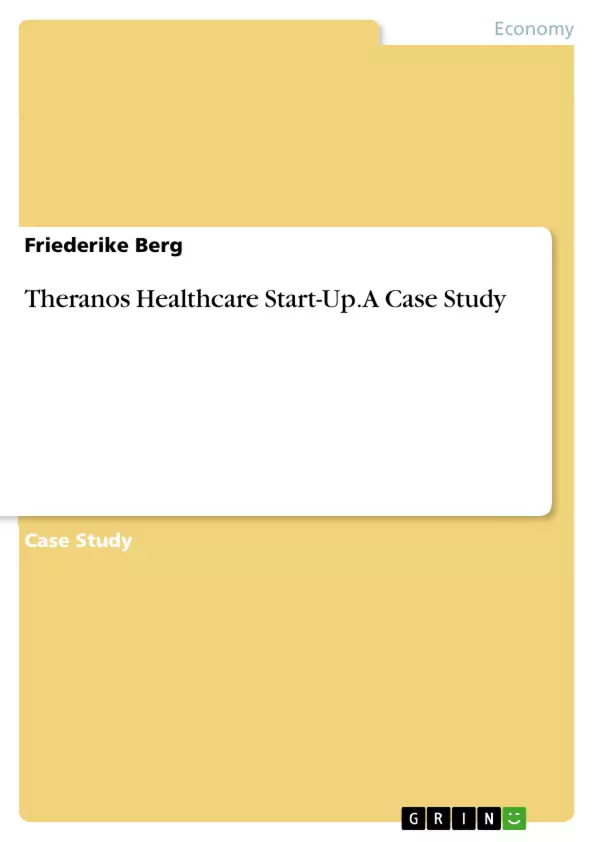"What do you dream will happen by 2025?" "That fewer people will have to say goodbye too soon to people that they love."" Theranos, a healthcare start-up, that promised to revolutionize blood testing, diagnoses, and the treatment of diseases, that was founded by Elizabeth Holmes, a Stanford dropout, in 2003, when she was just 19 years old.
Elizabeth Holmes was named one of the richest women and youngest self-made female billionaire in the United States by Forbes. She had a 50 % stake in Theranos, worth $4.5 billion, which was valued at $9 billion at that point. She was compared to the geniuses of Western culture like Archimedes and Beethoven. After fifteen years of operating Theranos, it turned out; "Holmes was just another start-up scammer who used blustery talk and an unclear vision of her product to sell investors on a relatively flimsy concept".
Table of Contents
- INTRODUCTION
- IDEATION, PRODUCT & TEAM
- IDEATION
- PRODUCT, CUSTOMERS & RESOURCES
- TEAM
- INVESTORS
- BOARD OF DIRECTORS
- RISE TO THE PEAK
- WHISTLEBLOWERS, DOWNFALL & ETHIC FACTOR
- WHISTLEBLOWERS
Objectives and Key Themes
This case study explores the rise and fall of Theranos, a healthcare start-up founded by Elizabeth Holmes that aimed to revolutionize blood testing and diagnostics. The study investigates the company's innovative ideas, its rapid growth, and its eventual downfall due to a lack of scientific validity, ethical concerns, and questionable business practices.
- The promise and potential of disruptive innovation in healthcare.
- The role of leadership and vision in company success and failure.
- The impact of ethical considerations on business practices and public perception.
- The influence of media coverage and whistleblower testimonies on corporate reputation.
- The importance of scientific rigor and validation in developing new technologies.
Chapter Summaries
- INTRODUCTION: This chapter introduces Theranos and its founder, Elizabeth Holmes, highlighting the ambitious goal of revolutionizing blood testing. It also touches on the company's valuation and the initial hype surrounding it.
- IDEATION, PRODUCT & TEAM: This chapter delves into the genesis of the Theranos concept, the development of the Edison blood-testing machine, and the company's initial staffing, including key figures like Elizabeth Holmes and Ramesh 'Sunny' Balwani. It also explores the company's financial strategy and its early investors.
- RISE TO THE PEAK: This chapter describes the rise of Theranos, highlighting its partnership with Walgreens and its peak valuation. It also discusses the company's limited success in obtaining FDA approval for its technology.
- WHISTLEBLOWERS, DOWNFALL & ETHIC FACTOR: This chapter focuses on the key figures who blew the whistle on Theranos, exposing the company's flawed technology and questionable business practices. It also addresses the ethical implications of Theranos' actions and the negative consequences for its employees and investors.
Keywords
The key focus topics of this case study are: Theranos, Elizabeth Holmes, Ramesh 'Sunny' Balwani, blood testing, diagnostics, disruptive innovation, healthcare technology, ethical considerations, whistleblower testimonies, media coverage, company valuation, investment, and corporate downfall.
Frequently Asked Questions
What was the main goal of Theranos?
Theranos aimed to revolutionize healthcare by offering rapid, low-cost blood testing and diagnostics using only a few drops of blood from a finger prick.
Who founded Theranos and when?
The company was founded in 2003 by Elizabeth Holmes, a 19-year-old Stanford University dropout.
Why did Theranos collapse?
The downfall was caused by the revelation that its technology was flawed and lacked scientific validity, alongside unethical business practices and misleading investors.
What was the "Edison" machine?
The Edison was the proprietary blood-testing device developed by Theranos, which was later revealed to be incapable of performing the vast majority of tests it claimed to do.
Who were the key figures involved in the scandal?
Key figures included the founder Elizabeth Holmes, COO Ramesh 'Sunny' Balwani, and various whistleblowers who eventually exposed the company's internal failures.
- Quote paper
- Friederike Berg (Author), 2019, Theranos Healthcare Start-Up. A Case Study, Munich, GRIN Verlag, https://www.grin.com/document/505693



